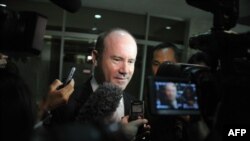Indonesia has summoned the Australian ambassador in Jakarta following reports indicating that Australia has allowed covert U.S. surveillance programs to operate in its embassies in Indonesia, Thailand, Vietnam, China and East Timor.
The news reports, based on documents leaked by former National Security Agency (NSA) contractor Edward Snowden, also said that the U.S. Embassy in Jakarta was used for spying on its president, Susilo Bambang Yudhoyono, and other Indonesian leaders. The reports also indicate the U.S. embassy itself houses wiretapping equipment; the facilities are described as being carefully concealed within embassy compounds.
After the meeting Friday, Australian diplomat Greg Moriarty said only that the talks had been good and that he now had to report back to his government.
The Indonesian Foreign Ministry has also summoned America's top diplomat in Jakarta to clarify the allegations.
Indonesian diplomats have said the activities would not only qualify as security breaches, but also as a serious violation of diplomatic norms and ethics.
In Beijing on Thursday, Chinese foreign ministry spokeswoman Hua Chunying demanded the United States explain its use of Australian embassies for spying.
The uproar over U.S. spying follows previous criticism from China, Russia and India that the United States has too much control over the infrastructure of cyberspace.
The news reports, based on documents leaked by former National Security Agency (NSA) contractor Edward Snowden, also said that the U.S. Embassy in Jakarta was used for spying on its president, Susilo Bambang Yudhoyono, and other Indonesian leaders. The reports also indicate the U.S. embassy itself houses wiretapping equipment; the facilities are described as being carefully concealed within embassy compounds.
After the meeting Friday, Australian diplomat Greg Moriarty said only that the talks had been good and that he now had to report back to his government.
The Indonesian Foreign Ministry has also summoned America's top diplomat in Jakarta to clarify the allegations.
Indonesian diplomats have said the activities would not only qualify as security breaches, but also as a serious violation of diplomatic norms and ethics.
In Beijing on Thursday, Chinese foreign ministry spokeswoman Hua Chunying demanded the United States explain its use of Australian embassies for spying.
The uproar over U.S. spying follows previous criticism from China, Russia and India that the United States has too much control over the infrastructure of cyberspace.





